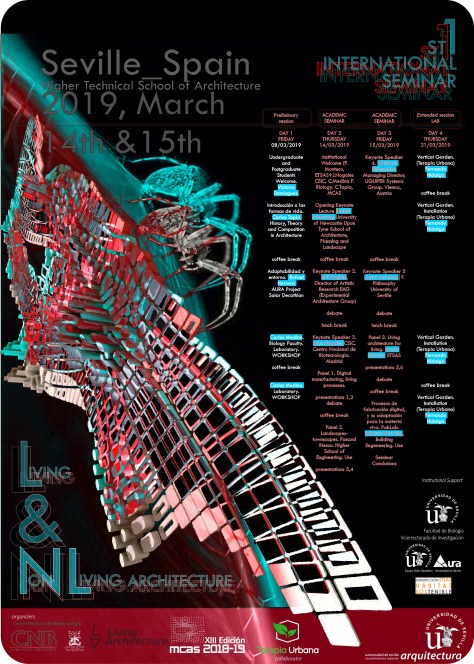
The Seminar finished on March 21st with the installation of a vertical garden. Thanks so much to all the participants.
Technological developments currently provide a potential that prioritizes their implementation rather than reflecting on the repercussions and consequences for the fields of knowledge involved. On the other hand, the current university studies take too long to receive the research results and remain in their disciplinary specificity. One of the tasks of the curricula is to be able to anticipate what does not yet exist to train their graduates with instruments and knowledge, as well as reflective capacity, for a world that changes more rapidly than the duration of university studies. As a form of approach, discussion, evaluation and transfer, this congress raises the old but not well-assumed relationship between biology and architecture. Experiments are being carried out all over the world, assembling laboratories, on biologically based materialities. To be in this process is to be in agreement with the sketches of what it will be to imagine the city of the future. However, these experimental processes require resources and technical resources that our university does not yet have. Our intention is to start the construction of a knowledge basin that is capable of evaluating while it is taking place, the socio-cultural implications, without leaving behind a specific technical training achievement. With these objectives, it would be to offer the results to the different university centres of the University of Seville so that they establish synergies beyond the borders of their respective disciplines. With this transversality, it is intended to expand the sense of the use of life as an element of construction, as well as to put on the table future fields of action among the specialists of the different branches in their respective centres of the USe.
Participatory Area:
L&NLA Seminar accepts both theoretical or practical papers in a broad, speculative, visionary, ethical and sustainable sense, according to:
Panel 1. Digital manufacturing, living processes.
Panel 2. Landscopes-townscapes.
Panel 3. Living architecture for living.
Contact
mcas@us.es

Abstract deadline: March 1st, 2019.
Full texts deadline: March 31st, 2019.
Digital proceedings release: June 2019.
Schedule (updated 26/04/2019, for certificating assistance): Download pdf version
preliminary session: 5 hours (+5 hours restricted to mcas students) /Seminar day 1: 10 hours / Seminar day 2: 10 hours /Extended Session: 2 hours + 5 hours vertical garden assemblage Practice
TOTAL (Hours): 32+5
AULA MAGNA 1 (FIRST FLOOR)
| Preliminary session for students | ACADEMIC SEMINAR | ACADEMIC SEMINAR | Extended session LAB for students | ||||
| DAY 1 | DAY 2 | DAY 3 | DAY 4 | ||||
| FRI | THUR | FRI | THUR | ||||
| 08/03/2019 | 14/03/2019 | 15/03/2019 | 21/03/2019 | ||||
| 9:00 – 9:30 | Undergraduate and Postgraduate Students Welcome. Victoria Domínguez
Introducción a las formas de vida. Carlos Tapia. History, Theory and Composition in Architecture |
Institutional Welcome (F. Montero, ETSAS+J.Nogales CSIC, C. Medina FB, C.Tapia MCAS |
Keynote Speaker 4. Design with Metabolism: Shaping the Inner Life of Things.Rachel Armstrong University of Newcastle Upon Tyne School of Architecture, Planning and Landscape |
Vertical Garden. Lecture. Fernando Hidalgo (Terapia Urbana) | 09:00 – 11:30 | ||
| Opening Keynote Lecture 1. Waltraut Hoheneder. Managing Director, LIQUIFER Systems Group. Vienna, Austria | |||||||
| 11:30 | |||||||
| coffee break | coffee break | coffee break | coffee break | ||||
| 12:00 – 12:30 | Adaptabilidad y entorno. Rafael Herrera. AURA Project Solar Decathlon |
Keynote Speaker 2. Carla Carmona. F. Philosophy University of Seville | Keynote Speaker 5. Rolf Hughes, Director of Artistic Research EAG (Experimental Architecture Group) | Vertical Garden. Instalation Fernando Hidalgo (Terapia Urbana) | 12:00 – 14:30 | ||
| 12:30 – 13:00 | |||||||
| 13:00 – 13:30 | |||||||
| 13:30 – 14:00 | |||||||
| 14:00 – 14:30 | debate | debate | |||||
| 14:30 – 15:00 | lunch break | lunch break | |||||
| 15:00 – 15:30 | |||||||
| 15:30 – 16:00 | |||||||
| 16:00 – 16:30 | Carlos Medina. Biology Faculty. Laboratory. WORKSHOP | Keynote Speaker 3. Juan Nogales CSIC. Centro Nacional de Biotecnología. Madrid | Panel 3. Living architecture for living. David Moreno. ETSAS | ||||
| 16:30 – 17:00 | Vertical Garden. Installation Fernando Hidalgo (Terapia Urbana) | 16:00 – 21:00 | |||||
| 17:00 – 17:30 | Panel 1. Digital manufacturing, living processes.
presentation 1 Development of self-regulated synthetic gene circuits and its application on controlled protein expression. Alejandro Ronco |
presentation 4 Edificios híbridos como sistemas vivos. Salvador Haddadi | |||||
| 17:30 – 18:00 | presentation 2 The inclusion of side metabolic reactions in the genome-scale metabolic model of Pseudomonas putida highlights the underground metabolism as key player in metabolic robustness. Francisco Javier Canalejo | presentation 5 Confort y sostenibilidad en la arquitectura habitada. Aplicación del conocimiento a la sociedad para la toma de decisiones. Milagrosa Borrallo-Jimenez y María LopezDeAsiain | |||||
| 18:00 – 18:30 | coffee break | debate | debate | ||||
| 18:30 – 19:00 | Carlos Medina. Laboratory. WORKSHOP | coffee break | coffee break | ||||
| 19:00 – 19:30 | Panel 2. Landscopes-townscapes. Pascual Riesco. Higher School of Engineering. USe | Digital manufacturing processes, and their adaptation for living matter. FabLab. Roberto Narváez, Building Engineering. USe | |||||
| 20:00 – 20:30 | |||||||
| 20:30 – 20:45 | presentation 3 | Seminar Conclusions | |||||
| 20:45 – 21:00 | Debate |
The University Institute of Architecture and Building Sciences collaborates institutionally with the Seminar, and the students of the Doctorate in Architecture Programme who wish to do so, can validate the Training Activity (AF4) by providing the certificate of attendance (for the Academic Seminar, March 14th and 15th) that is issued by the organization.
The USe Vice Chancellor of Research supports this event: VI PLAN PROPIO DE INVESTIGACIÓN Y TRANSFERENCIA – US 2019













